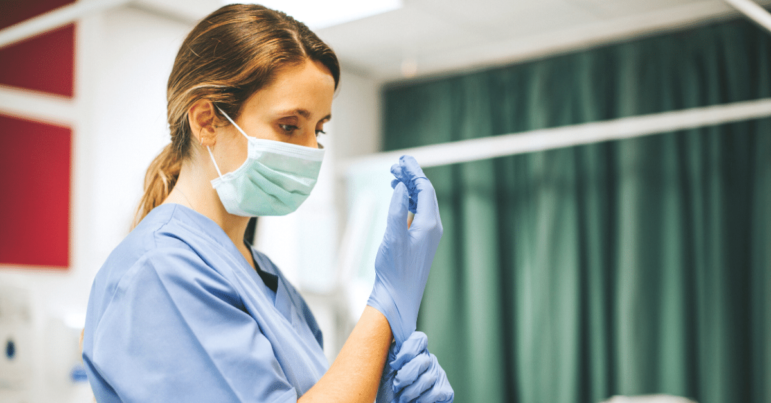There is no denying the crucial role that health care workers are playing in the Covid-19 pandemic. Americans are acknowledging their sacrifice and hard work by sending them meals and applauding them from their houses. But while these acts are much appreciated, they are small comfort to the thousands of health care workers who have been denied adequate protection and care.
Exploited and abandoned
Nurses in particular, many of whom are women of color, have been exploited, abandoned, and silenced many times so far in this crisis. The lack of adequate personal protective equipment (PPE) for nurses has been well-documented; some hospitals have gone as far as to suspend nurses who tried to fundraise for additional PPE. Other hospitals have forced nurses to continue working while showing Covid-19 symptoms, as long as they haven’t tested positive.
At hospitals across the country, nurses are speaking out about inadequate staffing levels putting them at even greater risk of infection. Earlier this month, emergency room nurses at DMC Sinai-Grace Hospital in Detroit protested the unsafe conditions at their hospital, which left nurses watching up to 20 patients at a time.
In a recent article in Medium for Workers Memorial Day, patient advocates and former nurses Lori Nerbonne and Kathy Day pointed out how policy changes around PPE are making it more dangerous for nurses to care for patients. Prior to Covid-19, the CDC required hospital staff to hospitals wear N95 masks, eye shields, gowns and gloves for an airborne virus. However, in the second week of March, the CDC relaxed their PPE guidelines, telling hospitals that health care workers could wear surgical masks and even scarves and bandanas to treat potential and confirmed Covid patients. Hospitals have used these guidelines to stop health care workers from wearing N-95 masks in the hospital.
“Without proper protective equipment, nurses know they are putting themselves, their patients, coworkers, and family members at risk,” write Nerbonne and Day. “This is yet one more way nurses feel unsupported or even abandoned, at a time when they deserve strong underpinnings to ensure their safety.”
The impact of gender and race
There is also a gendered and racial aspect to the mistreatment of nurses in the pandemic. About 90% of registered nurses in the U.S. are women, and nearly one quarter of RNs identify as people of color. As journalist Nell Lake wrote recently in a WBUR opinion piece, “the administration and profit-driven hospitals are taking advantage of nurses’ ethic of care, rooted in women’s historical obligation to meet the needs of the ill and vulnerable.”
People of color may feel even more pressure to “fulfill their duty”to care for patients even in dangerous conditions. In STAT News, Gem Scorp, a Filipino-American nurse in Queens, said, “At the time when no PPE was provided, it was Filipino nurses doing the job because, as you know, we are born risk takers when it comes to performing our duty and our calling.” Scorp saw Filipino nurses undertake some of the most dangerous tasks in Covid-19 units, but their work went unnoticed.
Black nurses face unique challenges with Covid-19 as well. Hospitals in communities of color tend to have fewer resources to deal with the pandemic, putting more strain on front-line workers. “The hospitals in neighborhoods and communities that serve urban Black communities are not as resourced as the hospitals in the suburbs. Moreover, testing has been especially difficult in low-income communities. There is an underestimation of cases in those communities because testing is not available,” said Jeri Crenshaw, an RN and physician’s assistant based in Louisville, Kentucky, in Essence.
How we can protect nurses
Hundreds of nurses have become sick, tragically, many have died from Covid-19. We need to do better to protect nurses, and acknowledge their sacrifice with real policies, not just applause. Here are some ways we can do that:
- Give nurses the weapons they need to fight Covid-19. That means adequate PPE, adequate staffing, not furloughing nurses when they’re needed or firing them for speaking out.
- Make PPE guidelines stricter. We know that people with Covid-19 are more likely to spread infection before they show symptoms, and that surgical masks are not enough. Lessening PPE guidelines puts people’s lives in danger.
- Amend sick leave policies, so that health care workers can take paid leave for two weeks when they have suspected Covid-19, even if they have not yet received a test. Often hospitals require nurses to have “confirmed” Covid-19 before giving nurses sick leave, but with testing limited, many nurses are forced to work while sick.
- Stop punishing nurses for talking about these essential issues with the media and organizing for change.
- Pass a “GI Bill” for health care professionals, with free access to mental health counseling, better electronic health records, and student debt relief.
Nurses have more than risen to the challenge of this pandemic, and we owe them much more than we are currently giving them. As Nell Lake writes, we must stop taking it for granted that nurses will care for patients like their own family, if nurses are not being treated like family.
